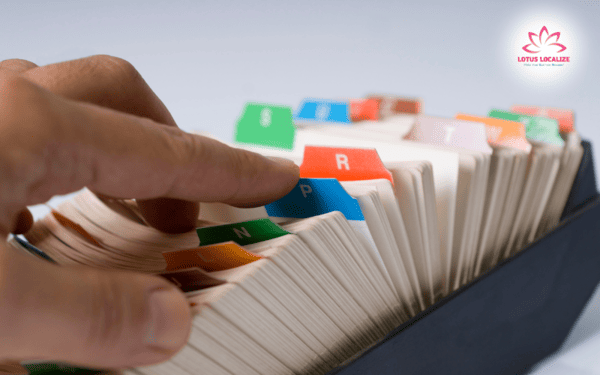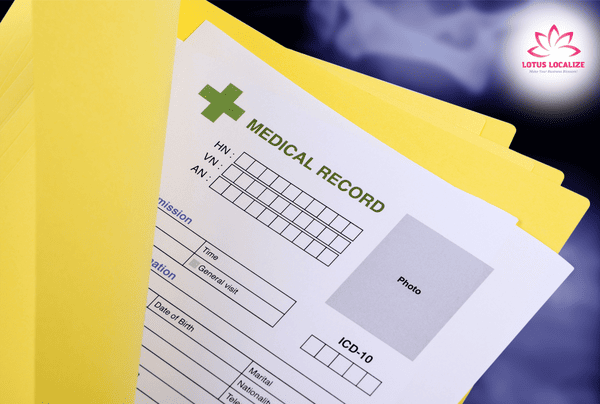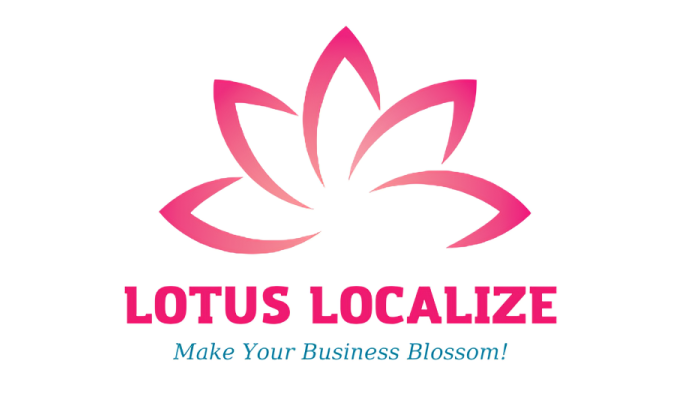
How veterinary translation ensures your pet gets the best treatment
When it comes to your pet’s health, clear communication is vital. Veterinary translation bridges the language gap between pet owners, veterinarians, and specialists worldwide. From translating medical records to ensuring accurate dosage instructions, professional veterinary translation guarantees that every detail is understood. This precision not only enhances treatment outcomes but also provides peace of mind, knowing your beloved companion is in expert hands.
The growing need for veterinary translation in a globalized world
As the world becomes increasingly interconnected, the need for veterinary translation has never been greater. With pet owners traveling, relocating, or seeking specialized treatments across borders, accurate translation of medical records, prescriptions, and care instructions is essential.
- International pet travel and relocation: The global pet travel services market is projected to grow from USD 2.3 billion in 2024 to USD 4.3 billion by 2033, at a CAGR of 6.94% (IMARC Group). This growth indicates a significant number of pets crossing borders, necessitating accurate translations of medical records to ensure consistent care.
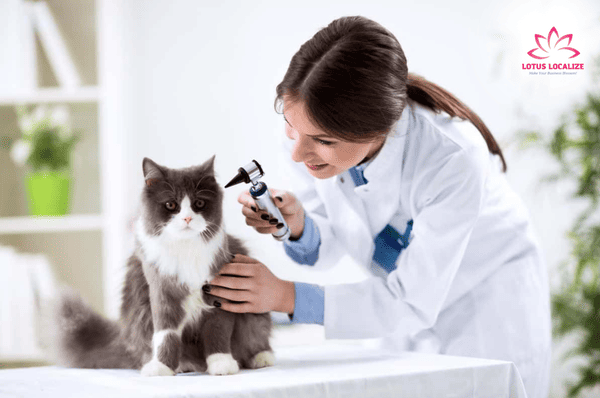
- Cross-border veterinary collaborations: The expanding pet care market, expected to reach USD 427.75 billion by 2032, with a CAGR of 6.45% (Fortune Business Insights), reflects increased international cooperation in veterinary research and services, requiring precise translation of medical documents and research materials.
- Imported pet products: With the global pet care market size anticipated to grow significantly, reaching USD 236.16 billion by 2030 (Grand View Research), there’s a rising influx of pet products across borders. Accurate translations of product labels and usage instructions are essential to ensure pet safety and regulatory compliance.
- Access to specialized treatments abroad: As the pet care industry is poised to swell from $320 billion today to almost $500 billion by 2030 (Bloomberg), more pet owners are seeking advanced treatments internationally, relying on clear communication facilitated by professional translation services.
These statistics underscore the growing reliance on veterinary translation to ensure the health and well-being of animals in an increasingly globalized world.
Read more: What is medical localization? Everything you need to know
What is veterinary translation?
Veterinary translation ensures clear communication between pet owners, veterinarians, and industry professionals, enabling accurate care, global collaboration, and the safe use of products across linguistic boundaries.
So what is veterinary translation?
Veterinary translation is a specialized field of translation that focuses on converting written and verbal content related to animal health and care between different languages. This service plays a critical role in ensuring accurate communication in a globalized world where pet care, medical treatments, and research are no longer confined by geographic boundaries.
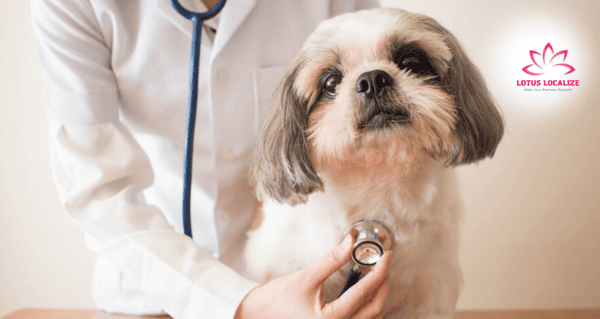
Veterinary translation helps bridge the gap between pet owners, veterinarians, researchers, and suppliers, ensuring that language differences do not hinder the well-being of animals. Veterinary translation is a crucial service in today’s globalized world, where pets and pet owners are more mobile than ever.
Key areas where veterinary translation makes a difference
Veterinary translation plays a crucial role in ensuring effective communication in various aspects of animal health care. Key areas where it has a significant impact include:
Medical records and documentation
Veterinary translation ensures that medical records, test results, and treatment histories are accurately translated. With more pet owners traveling internationally, having accurate translations of their pets’ medical records ensures continuity of care, minimizing the risk of misdiagnoses or inappropriate treatments.
Prescriptions and treatment plans
Translating prescriptions and treatment plans is essential for pet owners to correctly administer medications and follow veterinarian instructions. Clear translations prevent misinterpretations of medication dosages or treatment protocols, which could otherwise harm the pet’s health.

Research and scientific publications
Veterinary translation enables international collaboration in veterinary research, facilitating the exchange of clinical studies and findings. Translating research papers allows for the global dissemination of knowledge about new treatments, diseases, and innovations in animal health.
Product labeling and safety information
Veterinary translation is vital for ensuring the safe use of pet products, including food, medications, and grooming items. Accurate translation of product labels, usage instructions, and safety warnings is crucial, particularly for products that are sold internationally.
Global pet travel and relocation
As more pets are traveling or relocating across borders, veterinary translation ensures compliance with international regulations regarding health and vaccination requirements. Pet owners need to have their pets’ health records, vaccination certificates, and other relevant documents translated to meet entry requirements in different countries.
In each of these areas, veterinary translation ensures that language barriers do not compromise the health, safety, and well-being of animals.
Read more: How biomedicine translation fuels innovation in global health
What makes a veterinary translation expert?
A veterinary translation expert is a professional who not only possesses language proficiency but also has specialized knowledge of veterinary terminology, medical practices, and animal health care. This expertise ensures that translations are accurate, clear, and contextually appropriate for the veterinary field. Several key qualities and skills define a veterinary translation expert:
Proficiency in veterinary terminology
Veterinary translation requires a deep understanding of the specific vocabulary used in animal health care, including terms related to diseases, treatments, medications, and procedures.
Experts must be familiar with both common and complex veterinary terms, as well as their proper usage in different languages to avoid misinterpretation.
Strong language skills
In-depth proficiency in both the source and target languages is essential.
The translator must be able to convey the exact meaning and nuance of the original text, ensuring that nothing is lost in translation.
Experts should be skilled in reading, writing, and speaking the languages they work with to accurately interpret spoken or written veterinary information.
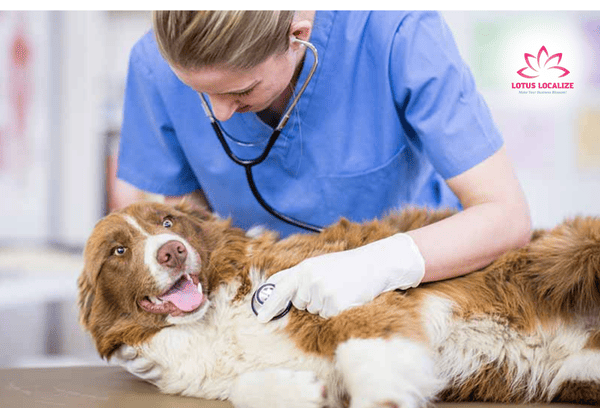
Knowledge of veterinary practices
A veterinary translation expert should have a background or experience in veterinary medicine, either through formal education or professional experience.
This knowledge helps them understand complex medical procedures and ensures that translations reflect the intended meaning of veterinary professionals.
Attention to detail and accuracy
Accuracy is critical in veterinary translation, as errors can lead to serious health risks for animals.
A veterinary translation expert must be meticulous in reviewing documents, ensuring that all information, including dosages, treatment plans, and health histories, is correctly translated.
Cultural sensitivity and contextual understanding
The translation must take into account cultural nuances and regional differences in veterinary practices.
An expert should be sensitive to how medical terms may differ between countries and understand the context in which the translation will be used.
Confidentiality and ethics
Veterinary translation often involves sensitive medical information, so experts must adhere to strict ethical standards and maintain confidentiality.
This includes respecting the privacy of both pets and their owners and ensuring that information is only shared with authorized individuals.
Experience with different types of veterinary documents
A veterinary translation expert must be skilled in translating various types of documents, including medical records, research papers, prescriptions, and product labels.
They must also be familiar with the legal and regulatory requirements for translating documents for international use.
Becoming a veterinary translation expert requires more than just linguistic ability. It demands a specialized understanding of veterinary science, a high degree of accuracy, and the ability to navigate cultural and ethical considerations. These experts play a crucial role in ensuring that animals receive the best possible care, no matter where they are located in the world.
Lotus Localize offers veterinary translation service
At Lotus Localize, we understand the critical importance of clear, accurate communication in the field of animal health care. Our veterinary translation services are designed to bridge language gaps in a globalized world, ensuring that pets, veterinarians, and animal health professionals receive the best care and information, regardless of language barriers.
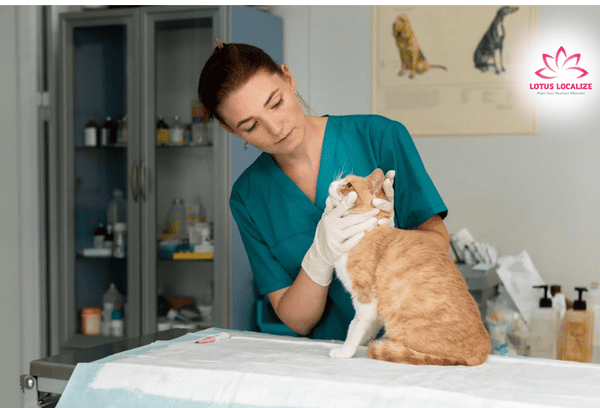
Our services include:
- Medical records translation: We ensure accurate translation of medical histories, test results, and treatment plans to maintain continuity of care for pets, especially in cross-border cases.
- Prescription and medication instructions: We provide precise translations of prescriptions and medication guidelines to ensure proper treatment and dosage administration.
- Research and scientific publications: Our team helps make veterinary research accessible by translating studies, clinical reports, and medical journals, promoting international collaboration.
- Product labeling: We ensure that pet product labels, including those for food, medications, and grooming products, are accurately translated for safety and compliance.
- Pet travel documentation: Our translation services help ensure that pets meet health and vaccination requirements for travel and relocation across borders.
With a team of skilled translators who specialize in veterinary terminology, Lotus Localize guarantees high-quality, culturally sensitive, and accurate translations tailored to the veterinary field. Our commitment is to ensure that your pet receives the best care no matter where they are or who is treating them.
In conclusion, veterinary translation is essential in bridging language gaps and ensuring that pets receive the best care possible, no matter where they are or who is treating them. By ensuring accurate translations of medical records, prescriptions, product labels, and travel documentation, veterinary translation helps facilitate clear communication between pet owners, veterinarians, and animal health professionals. This ultimately leads to better-informed decisions, accurate treatments, and a higher standard of care for pets, ensuring their health and well-being across borders and languages. With the growing need for global veterinary services, the role of professional translation is more crucial than ever in supporting the health of animals worldwide.
If you have any questions or need assistance with translation services for many industries: life science translation, education translation, technology translation, financial translation, marketing translation, manufacturing translation, government translation,… and interpretation services, localization services: game localization, software localization, website localization,… please contact Lotus Localize immediately at 0866 224 968 or visit the website: lotus-localize.com for advice on the best solutions!
QUALITY PROMISE
Lotus Localize offers consistent, high-quality service delivery in all customer engagements. Our in-house translators and staff adhere to well-established business processes, allowing us to communicate properly, deliver on time, and surpass client expectations.




